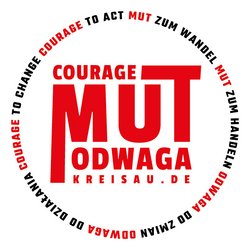Topic of the year 2018–2019: Courage to change, courage to act
It takes courage not to ignore these challenges, but instead, to actively face them. There are currently many political actors who deny facts such as climate change, who believe that sealing off and closing borders can keep the world's problems away from their own front door, who try to play off different groups of people against each other and spread hatred.
But even among those who are not closed to global change, there is currently a great discrepancy between their awareness for the necessity of change and their own behaviour. Many problems seem too big for individuals to change anything. Obviously, it needs more courage to act!
We from the Kreisau Initiative want to show possibilities in our project work to create positive change. Especially in the area of social-ecological transformation, but also in our other focus topics, we would like to invite people to become active as individuals and together with others. Hereby, we want to overcome borders between countries, social groups and different perceptions so that people can seek dialogue with each other, exchange ideas and contribute their experiences and views. It is necessary to break through supposedly immovable dogmas and ingrained behavioural patterns in order to actively shape change, instead of just learning to live with the situation. It's about discovering the manifold actions and initiatives that locally have an impact on the global development.
Our educational work at the Kreisau Initiative aims at bringing people together and at creating a space in which we can collaboratively develop positive visions of a better future. We do this by creating communities across boarders, by creating a feeling of connectedness. Together we work on a feasible Utopia. It is especially about empowerment, i.e. the competence of those people and groups to act, who tend to be marginalized in social discourse. Experiencing the ability to act on an international project increases both one's own self-confidence as well as the sensitivity for the immediate environment, on an individual level, as well as on a group-level.
The questions that will accompany us in our work this year are: How can the gap between the knowledge of the need to act, and action itself be closed? How can we encourage people to engage in dialogue and actively shape their environment, especially through education and by bringing them together? How can we bring a broad discourse on issues of social-ecological transformation to the educational landscape by training professionals? How can we integrate other target groups that are underrepresented or completely marginalised in education into our project work and enable dialogue and empowerment for them?
We live in a time full of challenges, but also with opportunities for each and every one of us to take influence. With the necessary courage to act, it is possible to create a future worth living. For all.
Translation: Robert Bowen

